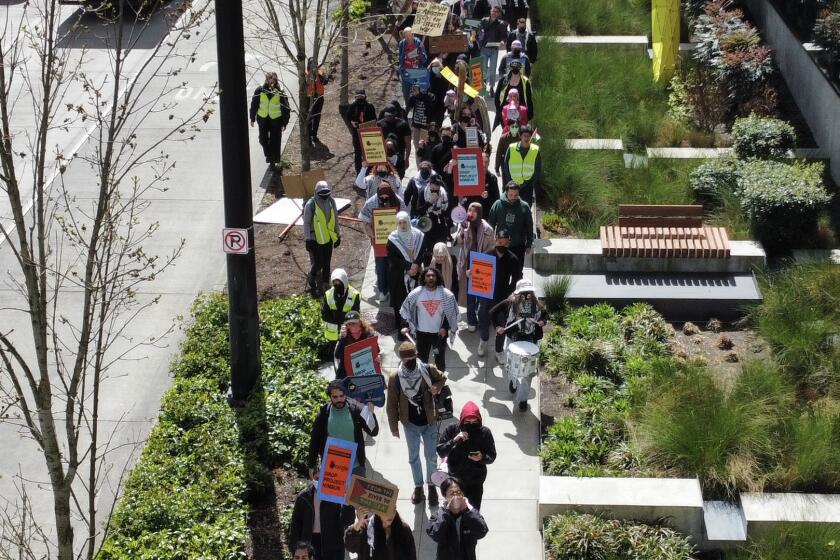Yahoo remains tight-lipped about Verizon deal in third-quarter earnings report
If this were any other financial quarter for Yahoo, its earnings results would be unremarkable. Net revenue continued to decline. Profit was slightly up. It exceeded analysts’ low expectations.
But this wasn’t an ordinary quarter. It was Yahoo’s first reporting period since Verizon agreed to buy the beleaguered Sunnyvale, Calif., company. It was the first since it dropped the bombshell that it got hacked in 2014 in a breach that compromised 500 million user accounts — an attack that may have a “material” impact on Verizon’s $4.8-billion offer.
On both the breach and the sale, Yahoo remained tight-lipped, forgoing its usual live webcast with analysts — presumably to dodge thorny questions. After the close of markets, Yahoo instead issued its report and a statement from Chief Executive Marissa Mayer, who said the company is “busy preparing for integration with Verizon,” and it remains “very confident, not only in the value of our business, but also in the value Yahoo products bring to our users’ lives.”
The company’s silence doesn’t come as a surprise, according to Forrester Research analyst Fatemeh Khatibloo, because Yahoo is likely under constraints as to what it can say.
“It would have been an hour of ‘Sorry, no comment,’ which probably would have been more frustrating,” Khatibloo said.
The company recorded $1.3 billion in revenue in the three months ending Sept. 30, up from $1.2 billion a year earlier. But its traffic acquisition costs soared, doubling from $223 million during the same period last year to $448 million this year, which meant, overall, its net revenue actually declined. Profit doubled from $76 million last year to $163 million. Yahoo recorded earnings of 17 cents per diluted share.
The company’s stock closed on Tuesday at $41.68, down 11 cents. It was up 1.42% in after-hours trading.
Despite the improvement in top-line revenue, business experts said that number was in no way a victory for Yahoo.
“Yahoo is having trouble growing,” said Erik Gordon, a professor at the Ross School of Business at the University of Michigan. “The only way it can grow revenue is to spend a lot of money to get those revenues. If you ran a restaurant, of course you’d get an extra $100,000 in sales if you spent an extra $150,000 in marketing, but that doesn’t mean your restaurant is doing great.”
If there was an upside, Gordon said, it was that the results are “not enough to kill the Verizon deal, if the data breach doesn’t kill it.”
“There was fear that the results could be surprisingly bad and make Verizon wonder whether they want the company at all,” Gordon said. “But I think the results are close enough to what has always gone on.”
Verizon agreed to buy Yahoo’s core business in July, giving the struggling Internet brand a lifeline. The deal, which at the time appeared to be cut and dried, was thrown into uncertainty when Yahoo revealed last month it had suffered a massive customer data breach in 2014. The breach, which Yahoo said it didn’t discover until after Verizon had agreed to buy it, affected some 500 million accounts and compromised users’ email addresses, dates of birth, encrypted passwords and security answers.
While Verizon initially said it lacked information to determine whether the breach would affect the deal, its general counsel Craig Silliman told reporters in October that the company had “reason to believe that Yahoo’s data breach has had a material impact.”
The New York Post, citing unnamed sources, had reported weeks earlier that Verizon sought a $1-billion discount on Yahoo as a result of the breach.
Verizon declined to comment further.
Data breaches like the one Yahoo experienced have been known to affect mergers and acquisitions, sometimes leading to discounts or even deals falling through entirely because the acquirer doesn’t want to inherit a company’s problems.
Technology analysts remained confident that the Verizon deal would go through as expected, with BMO Capital Markets analyst Dan Salmon saying in a note to investors that “it is a low likelihood that Verizon was completely unaware of the email hack, but perhaps the extent of it has become more apparent.”
Others, like SunTrust’s Robert Peck, were not so sure, suggesting in his note to investors that a question mark now looms over the deal.
“Can Verizon…leverage [the hacking and surveillance issues] to either negotiate the price down or walk away?” he said. “If Verizon tries to do that, can Yahoo sue to enforce the agreement in its entirety? In a scuttled deal, can Yahoo again open up the process to other bidders?”
If the deal falls through, though, it would be “disastrous” for Yahoo and its shareholders, Gordon said, because “then all you have is a deteriorating Yahoo with this data breach hanging over its head,” he said. “Even with a space suit, a new buyer isn’t going to touch Yahoo.”
Twitter: @traceylien







